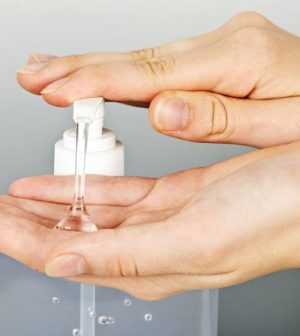- Recognizing the Signs of Hypothyroidism
- 10 Strategies to Overcome Insomnia
- Could Artificial Sweeteners Be Aging the Brain Faster?
- Techniques for Soothing Your Nervous System
- Does the Water in Your House Smell Funny? Here’s Why
- Can a Daily Dose of Apple Cider Vinegar Actually Aid Weight Loss?
- 6 Health Beverages That Can Actually Spike Your Blood Sugar
- Treatment Options for Social Anxiety Disorder
- Understanding the Connection Between Anxiety and Depression
- How Daily Prunes Can Influence Cholesterol and Inflammation
Hand Sanitizer Vapors Can Cause Nausea, Dizziness

The coronavirus pandemic has had an unexpected side effect — a wave of bad reactions to alcohol-based hand sanitizers.
Vapors from the products can cause headache, nausea and dizziness, according to the U.S. Food and Drug Administration, which advises consumers to use the products in well-ventilated areas.
“We have received increasing reports of these side effects since the start of the COVID-19 pandemic,” the agency said in a news release. “Most people experienced minor or minimal effects; however, some cases required treatment by a health care professional.”
The incidents likely occurred when people used sanitizers in enclosed spaces or places with poor air circulation.
The FDA said it is continuing to monitor reports of adverse events involving hand sanitizers.
“At this time, we are not making any changes to the Drug Facts label for hand sanitizers but will inform the public if additional information becomes available,” the agency said.
It reminded consumers that hand sanitizers should be used in a well-ventilated area. If you are applying them in an enclosed area such as a car, open a window until the product is dry and vapors have cleared, the FDA advised.
“Make sure your hands are completely dry and vapors have cleared before doing any activities involving heat, sparks, static electricity or open flames,” it added. “Read and follow the directions and warnings on the OTC Drug Facts label.”
The FDA noted that some hand sanitizers may be contaminated with harmful ingredients, so it’s important to check the agency’s “do-not-use” list to determine if the product you have is safe.
If you develop side effects from a hand sanitizer or someone accidentally ingests it, contact a health care provider or poison control at 800-222-1222 or online. Call 911 if the person has trouble breathing or becomes unconscious, the FDA said.
Hand sanitizers should be stored out of children’s reach and sight. Swallowing even a small amount can cause alcohol poisoning in children, which could result in serious illness or death, the agency warned.
More information
The U.S. Food and Drug Administration has information about hand sanitizers consumers should not use.
SOURCE: U.S. Food and Drug Administration, news release, June 16, 2021
Source: HealthDay
Copyright © 2026 HealthDay. All rights reserved.










